Mathieu Chollet
Probing Experts' Perspectives on AI-Assisted Public Speaking Training
Jul 10, 2025Abstract:Background: Public speaking is a vital professional skill, yet it remains a source of significant anxiety for many individuals. Traditional training relies heavily on expert coaching, but recent advances in AI has led to novel types of commercial automated public speaking feedback tools. However, most research has focused on prototypes rather than commercial applications, and little is known about how public speaking experts perceive these tools. Objectives: This study aims to evaluate expert opinions on the efficacy and design of commercial AI-based public speaking training tools and to propose guidelines for their improvement. Methods: The research involved 16 semi-structured interviews and 2 focus groups with public speaking experts. Participants discussed their views on current commercial tools, their potential integration into traditional coaching, and suggestions for enhancing these systems. Results and Conclusions: Experts acknowledged the value of AI tools in handling repetitive, technical aspects of training, allowing coaches to focus on higher-level skills. However they found key issues in current tools, emphasising the need for personalised, understandable, carefully selected feedback and clear instructional design. Overall, they supported a hybrid model combining traditional coaching with AI-supported exercises.
Robust Understanding of Human-Robot Social Interactions through Multimodal Distillation
May 06, 2025Abstract:The need for social robots and agents to interact and assist humans is growing steadily. To be able to successfully interact with humans, they need to understand and analyse socially interactive scenes from their (robot's) perspective. Works that model social situations between humans and agents are few; and even those existing ones are often too computationally intensive to be suitable for deployment in real time or on real world scenarios with limited available information. We propose a robust knowledge distillation framework that models social interactions through various multimodal cues, yet is robust against incomplete and noisy information during inference. Our teacher model is trained with multimodal input (body, face and hand gestures, gaze, raw images) that transfers knowledge to a student model that relies solely on body pose. Extensive experiments on two publicly available human-robot interaction datasets demonstrate that the our student model achieves an average accuracy gain of 14.75\% over relevant baselines on multiple downstream social understanding task even with up to 51\% of its input being corrupted. The student model is highly efficient: it is $<1$\% in size of the teacher model in terms of parameters and uses $\sim 0.5$\textperthousand~FLOPs of that in the teacher model. Our code will be made public during publication.
Interact with me: Joint Egocentric Forecasting of Intent to Interact, Attitude and Social Actions
Dec 21, 2024



Abstract:For efficient human-agent interaction, an agent should proactively recognize their target user and prepare for upcoming interactions. We formulate this challenging problem as the novel task of jointly forecasting a person's intent to interact with the agent, their attitude towards the agent and the action they will perform, from the agent's (egocentric) perspective. So we propose \emph{SocialEgoNet} - a graph-based spatiotemporal framework that exploits task dependencies through a hierarchical multitask learning approach. SocialEgoNet uses whole-body skeletons (keypoints from face, hands and body) extracted from only 1 second of video input for high inference speed. For evaluation, we augment an existing egocentric human-agent interaction dataset with new class labels and bounding box annotations. Extensive experiments on this augmented dataset, named JPL-Social, demonstrate \emph{real-time} inference and superior performance (average accuracy across all tasks: 83.15\%) of our model outperforming several competitive baselines. The additional annotations and code will be available upon acceptance.
EARN Fairness: Explaining, Asking, Reviewing and Negotiating Artificial Intelligence Fairness Metrics Among Stakeholders
Jul 16, 2024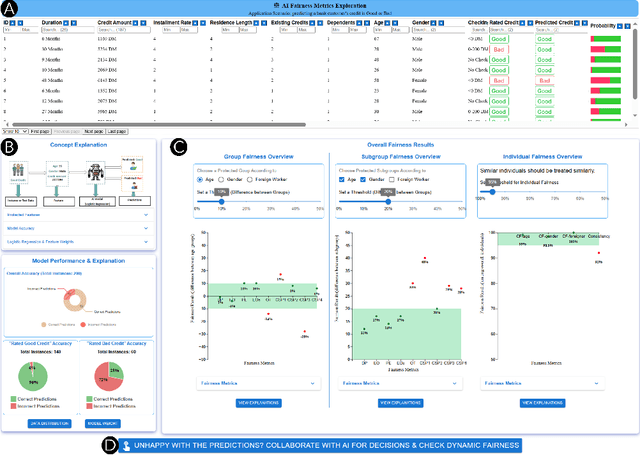

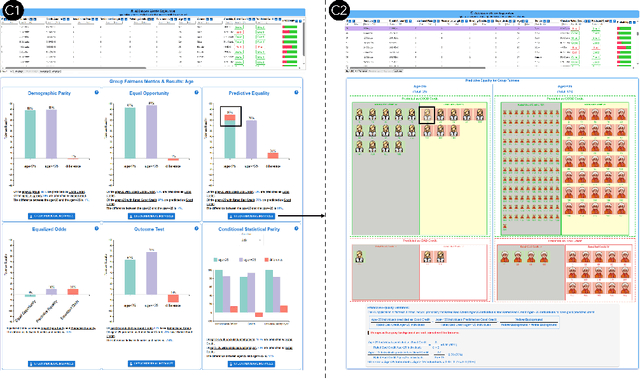
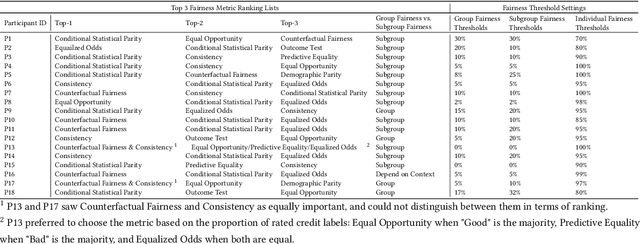
Abstract:Numerous fairness metrics have been proposed and employed by artificial intelligence (AI) experts to quantitatively measure bias and define fairness in AI models. Recognizing the need to accommodate stakeholders' diverse fairness understandings, efforts are underway to solicit their input. However, conveying AI fairness metrics to stakeholders without AI expertise, capturing their personal preferences, and seeking a collective consensus remain challenging and underexplored. To bridge this gap, we propose a new framework, EARN Fairness, which facilitates collective metric decisions among stakeholders without requiring AI expertise. The framework features an adaptable interactive system and a stakeholder-centered EARN Fairness process to Explain fairness metrics, Ask stakeholders' personal metric preferences, Review metrics collectively, and Negotiate a consensus on metric selection. To gather empirical results, we applied the framework to a credit rating scenario and conducted a user study involving 18 decision subjects without AI knowledge. We identify their personal metric preferences and their acceptable level of unfairness in individual sessions. Subsequently, we uncovered how they reached metric consensus in team sessions. Our work shows that the EARN Fairness framework enables stakeholders to express personal preferences and reach consensus, providing practical guidance for implementing human-centered AI fairness in high-risk contexts. Through this approach, we aim to harmonize fairness expectations of diverse stakeholders, fostering more equitable and inclusive AI fairness.
Affect-LM: A Neural Language Model for Customizable Affective Text Generation
Apr 22, 2017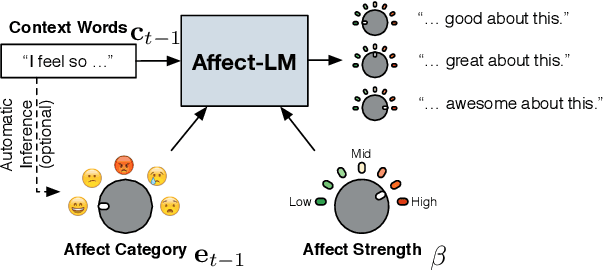

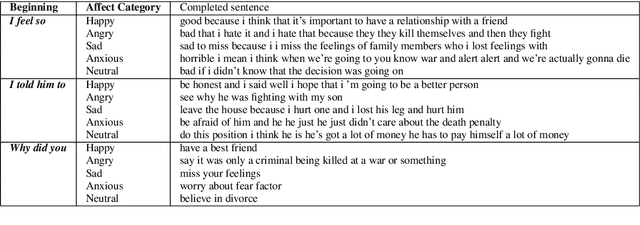

Abstract:Human verbal communication includes affective messages which are conveyed through use of emotionally colored words. There has been a lot of research in this direction but the problem of integrating state-of-the-art neural language models with affective information remains an area ripe for exploration. In this paper, we propose an extension to an LSTM (Long Short-Term Memory) language model for generating conversational text, conditioned on affect categories. Our proposed model, Affect-LM enables us to customize the degree of emotional content in generated sentences through an additional design parameter. Perception studies conducted using Amazon Mechanical Turk show that Affect-LM generates naturally looking emotional sentences without sacrificing grammatical correctness. Affect-LM also learns affect-discriminative word representations, and perplexity experiments show that additional affective information in conversational text can improve language model prediction.
Expressing social attitudes in virtual agents for social training games
Feb 20, 2014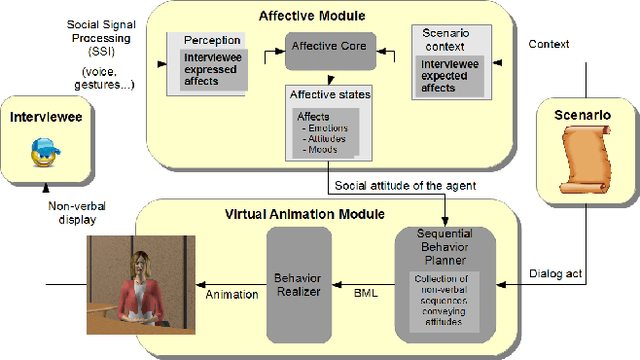
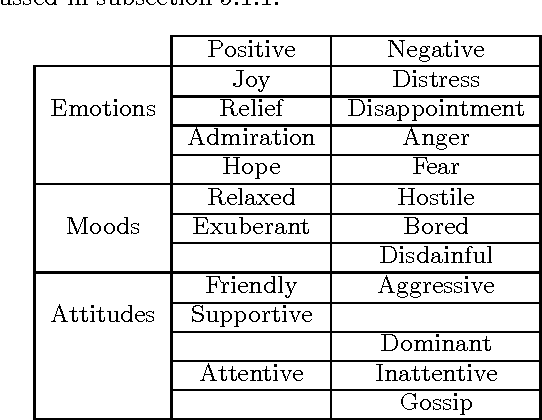
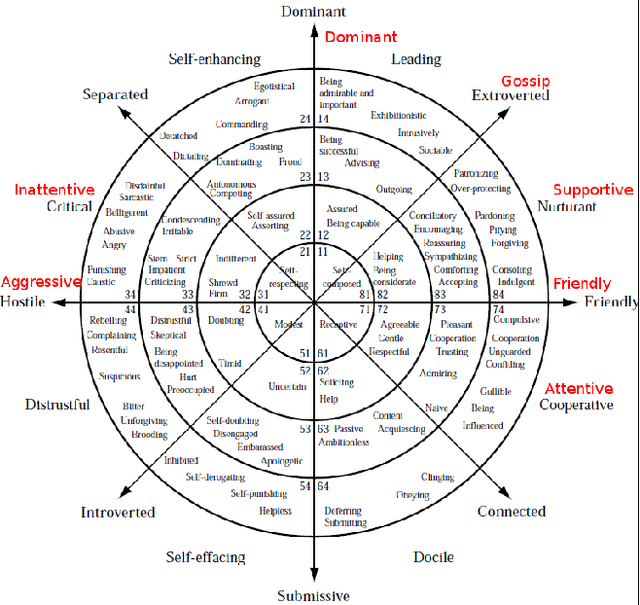

Abstract:The use of virtual agents in social coaching has increased rapidly in the last decade. In order to train the user in different situations than can occur in real life, the virtual agent should be able to express different social attitudes. In this paper, we propose a model of social attitudes that enables a virtual agent to reason on the appropriate social attitude to express during the interaction with a user given the course of the interaction, but also the emotions, mood and personality of the agent. Moreover, the model enables the virtual agent to display its social attitude through its non-verbal behaviour. The proposed model has been developed in the context of job interview simulation. The methodology used to develop such a model combined a theoretical and an empirical approach. Indeed, the model is based both on the literature in Human and Social Sciences on social attitudes but also on the analysis of an audiovisual corpus of job interviews and on post-hoc interviews with the recruiters on their expressed attitudes during the job interview.
 Add to Chrome
Add to Chrome Add to Firefox
Add to Firefox Add to Edge
Add to Edge